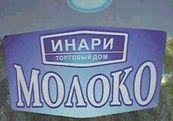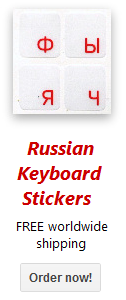 FR FR |
About us | Home | User agreement | Link to us |
The Indefinite Pronouns
The words некто (a certain person), нечто (a certain thing), некоторый (some, certain), несколько (some, several), ктo-то (somebody), чтo-то (something), ктo-нибудь (anybody), чтo-нибудь (anything), какoй-то (some kind of), кoе-ктo (somebody) are the indefinite pronouns. They refer to indefinite or unknown things, people, features or quantities. The pronunciation samples for these pronouns are given below.
Let's consider some examples:
- В некотором царстве жил царь.
- (In some kingdom there lived a king.)
- Кто-то взял мою ручку.
- (Somebody took my pen.)
- Скажите что-нибудь.
- (Say something.)
Pronunciation of indefinite pronouns
Use the table below to practice your pronunciation of the Russian indefinite pronouns.
| Audio | Russian word | English translation | Pronunciation |
| некоторый | some, certain | NYEH-kah-tah-riy | |
| несколько | some, several | NYEHS-kahl'-kah | |
| ктo-то | somebody | KTOH-tah | |
| чтo-то | something | SHTOH-tah | |
| ктo-нибудь | anybody | KTOH-nee-boot' | |
| чтo-нибудь | anything | SHTOH-nee-boot' | |
| --- | некто | a certain person | NYEK-tah |
| --- | нечто | a certain thing | NYEHSH-tah |
| --- | какoй-то | some kind of | kah-KOY-tah |
| --- | кoе-ктo | somebody | koyeh-KTOH |
How to form the indefinite pronouns
The indefinite pronouns are formed from the interrogative pronouns with the help of such prefixes as не-, кое- and suffixes -то, -либо, -нибудь.
Note, that the suffixes -то, -либо, -нибудь and the prefix кое- are written with a hyphen. On the contrary, the pronouns with the prefix не are always written as a single word. The prefix кое loses its hyphen when it is separated from a pronoun by a preposition, for example:
- Эта книга заставила меня кое о чём подумать.
- (This book made me think about some things.)
The good news is that the indefinite pronouns некто and нечто do not change by cases. They are always used in the nominative. The rest of the indefinite pronouns change like their interrogative counterparts.
The indefinite pronouns with the prefix кое- are used to talk about things known to the speaker but unfamiliar to the listener.
- Мне нужно тебе кое-что сказать
- (I have something to tell you.)
- Он пытался выудить у меня кое-какую информацию.
- (He tried to fish some information out of me.)
The indefinite pronouns formed with the suffixes -то and -нибудь are the most common ones. There is a difference in the meaning of these two suffixes. The suffix -то is used to talk about people, things and features which are real and definite, but not familiar to the speaker.
- Кто-то поёт.
- (Somebody is singing.)
- Я нашёл чей-то портфель.
- (I found somebody's case.)
- Какой-то человек искал тебя.
- (Some man was looking for you.)
The suffix -нибудь is used when people and things are indefinite or not chosen by the speaker from several possible ones.
- Пусть кто-нибудь останется и поможет мне.
- (Let someone stay and help me.)
- Давай посадим на клумбу какие-нибудь цветы.
- (Let's plant some flowers into the flowerbed.)
Related Lessons
Got questions?
Ask them in the Russian Questions and Answers — a place for students, teachers and native Russian speakers to discuss Russian grammar, vocabulary, pronunciation, and other aspects of the Russian language.
Copyright 2001-2026 MasterRussian.com | Privacy Policy | Contact Us
 Russian Lessons
Russian Lessons
- Russian alphabet
- Names of letters
- Russian Q&A new
- Pronunciation: Cons.
- Pronunciation: Vowels
- Noun Gender/Number
- Cases of Nouns
- Russian Greetings
- Personal Pronouns
- Learning Russian
- 1000 Common Words
- 500 Russian Verbs
- Top Russian Nouns
- » All lessons
- » Guest lessons
 Browse Topics
Browse Topics
- Start learning Russian
- Forum
- Bookstore
- Dictionaries
- Russian - basic
- Russian - adv
- Pronunciation
- Russian Blog new
- Reading
- Test & quizzes
- Translation
- Verbs
- Verb Conjugations
- Russian numbers
- Russian Tests new
- Vocabulary
- Writing
- Folk music
- Fun stuff
- Leo Tolstoy
- Learner's lore
- Literature
- Personal blogs
- Picture Dictionary new
- Proverbs
- Publications
- Radio & TV
- Russian culture
- Schools in Russia
- Russian Words
- Russian names
- Software
- Russian Words iPhone
Clicks the "Like" button below to get daily updates on Facebook!
Click "Add to circles" to learn Russian on Google+

Search MasterRussian

English » Russian dictionary

WORD OF THE DAY
![]() RSS
|
iGoogle
|
My Yahoo!
RSS
|
iGoogle
|
My Yahoo!
Meaning: now, nowadays, today
Pronunciation: [tee-PYEHR']
Learn Russian words! »
TODAY'S STREET SIGN

Russian: Молоко
English: Milk
FOLLOW US ON TWITTER

MasterRussian on Twitter


